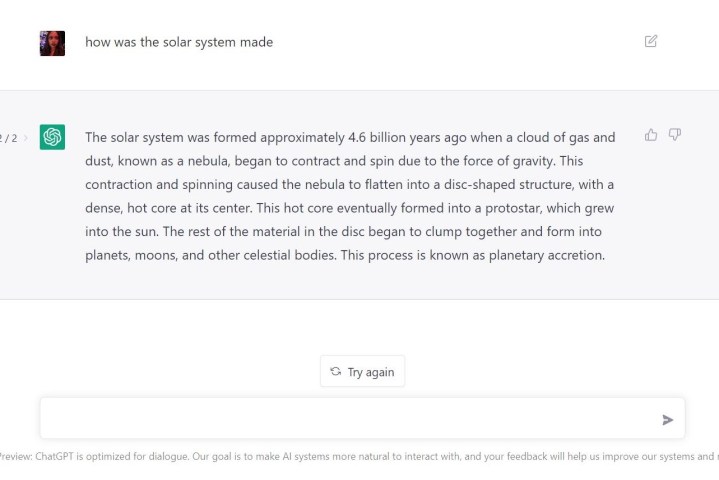
The ChatGPT general-purpose chatbot prototype developed by OpenAI is now available as a free research preview that anyone can try out.
OpenAI, well-known for having developed the text-to-image generator DALL-E, is now taking a stab at automatic text-generation AI. The chatbot is based on OpenAI’s GPT-3.5 technology model, which is intended to have more of a flow, as if you are chatting with a real person. Typing in your query should result in a detailed response of several sentences or paragraphs

Is ChatGPT free to use?
Yes, the basic version of ChatGPT is completely free to use. It’s not free for OpenAI to continue runningit, of course. Estimates are currently that OpenAI spends around $3 million per month to continue running ChatGPT, which is around $100,000 per day.
OpenAI has also recently announced a new paid, premium version of its chatbot, called ChatGPT Professional. You can currently only join the waitlist, though, and the monthly price is unknown. The features that may be available in ChatGPT Premium include no throttling, an unlimited number of prompts, and no blackouts.
While ChatGPT remains free, it is sometimes unavailable due to being “at capacity,” which has been ongoing complaint recently.
Do you need to download ChatGPT?
ChatGPT is available via a webpage, so no downloading is needed. OpenAI has yet to release an official app, despite the fact that app stores are full of fake versions. These should be installed and used with caution, as they are not official ChatGPT apps.
You can, apparently, download ChatGPT locally through Github, though it’s not necessary to use it.
How to use ChatGPT
The ChatGPT webpage is simple and includes an area for the results to populate and a text box at the bottom of the page for users to type inquiries. We started with questions, however, OpenAI recommends inputting a statement for the best possible result.
For example, inputting “explain how the solar system was made” will give a more detailed result with more paragraphs than “how was the solar system made,” even though both inquiries will give fairly detailed results. You also have the option for more specific inputting requests for an essay with a specific number of paragraphs or a Wikipedia page. We got an extremely detailed result with the request “write a four-paragraph essay explaining Mary Shelley’s Frankenstein.”
If there is enough information available, the generator will fulfill the commands with accurate details. Otherwise, there is potential for ChatGPT to begin filling in gaps with incorrect data. OpenAI notes that these instances are rare. The brand also notes that ChatGPT also currently has “limited knowledge of world events after 2021.”
Even so, you have the option to input queries continuously until you close your browser or reset the thread to clear your previous requests. You also have the option to use ChatGPT in dark mode or light mode.
You can access the OpenAI Discord server and blog from this webpage and log out from there.
How to register an OpenAI account
Using the ChatGPT chatbot is fairly simple, as all you have to do is type in your text and receive the information. However, OpenAI does require an account before you can use any of its tools, so if you don’t have one, you will have to register. You have the option of choosing an easy login with a Google or Microsoft account.
Otherwise, if you have any other kind of email, you can enter it manually. After this, you must enter a phone number; however, keep in mind that you cannot use a virtual phone number (VoIP) to register for OpenAI. You will then receive a confirmation number, which you will enter on the registration page to complete the setup.
Once you see some housekeeping rules about ChatGPT, including potential errors in data, how OpenAI collects data, and how users can submit feedback, you know you have successfully registered.
ChatGPT prompts and examples
Well, that’s the fun part. Since its launch, people have been experimenting to discover everything the chatbot can and can’t do — and some of the results have been mind-blowing.
Learning the kinds of prompts and follow-up prompts that ChatGPT responds well to requires some experimentation though. Much like we’ve learned to get the information we want from traditional search engines, it can take some time to get the best results from ChatGPT. Heck, there are already online courses being published and sold on the matter.
It really all depends on what you want out of it. To start out, try using it to write a template blog post, for example, or even blocks of code if you’re a programmer.
Our writers experimented with ChatGPT too, attempting to see if it could handle holiday shopping or even properly interpret astrological makeup. In both cases, we found limitations to what it could do while still being thoroughly impressed by the results.
But the fun is in trying it out yourself. Whether you think ChatGPT is an amazing piece of tech or will lead to the destruction of the internet as we know it, it’s worth trying out for yourself to see just what it’s capable of.
Can ChatGPT be used for essay writing?
The use of ChatGPT has been full of controversy, with many onlookers considering how the power of the AI will change everything from search engines to novel writing.
Essay writing for students is one of the most obvious examples of where ChatGPT could become a problem. ChatGPT might not write this article all that well, but it feels particularly easy to use for essay writing.
Teachers, school administrators, and developers are already finding different ways around this and banning the use of ChatGPT in schools. Others are more optimistic about how ChatGPT might be used for teaching, but plagiarism is undoubtedly going to continue being an issue in terms of education in the future.
Editors’ Recommendations





